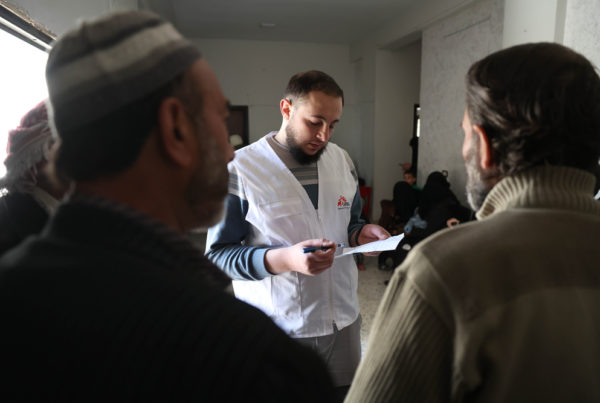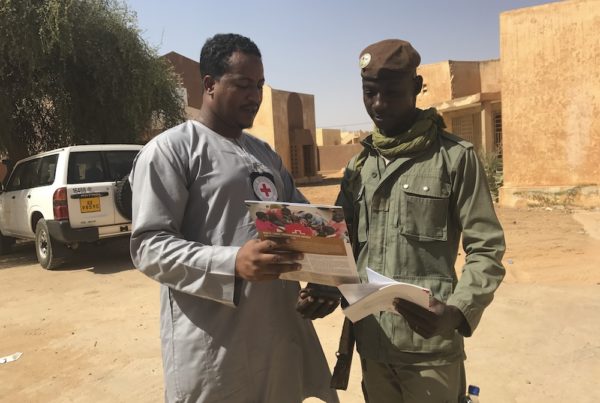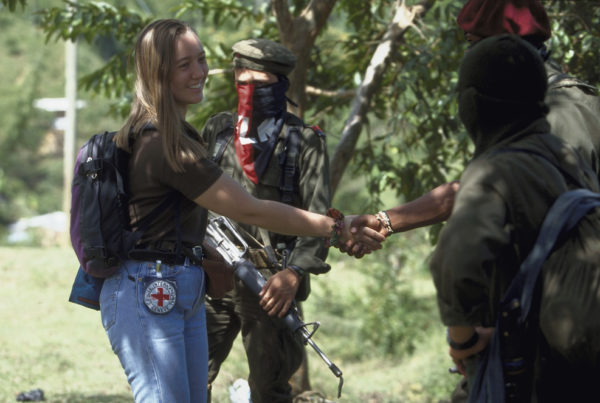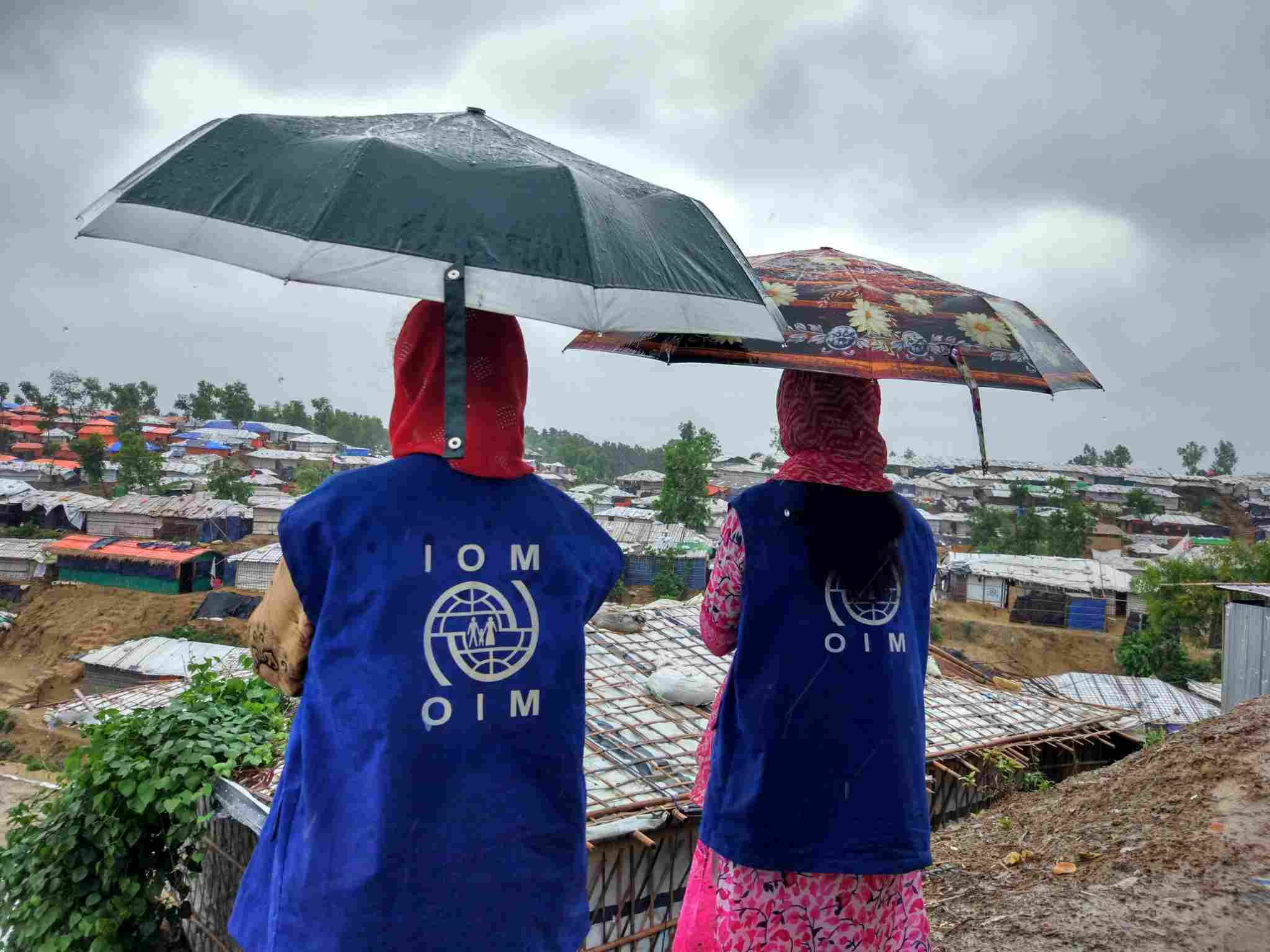
Negotiating in times of disasters is critical to ensure aid reaches people in crisis.
Usually, you’ll negotiate at multiple ‘frontlines’ that emerge in the immediate aftermath of a disaster. This also generally means you need to deal with a variety of counterparts all at once.
Whether an earthquake, a cyclone, flooding, or an unexpected explosion in a heavily populated city, disasters can create or exacerbate existing tensions between actors involved in humanitarian response.
This can both influence or be influenced by the interplay between politics, logistics and relationships.
The efficiency and relevance of your response can be significantly affected by how fast coordination structures are established, supply chains enabled, and resources mobilised.
However, navigating these negotiations can be complex and challenging due to the urgency of the situation, the ensuing chaos, the presence of multiple stakeholders, and the heightened emotions involved.
At the Centre of Competence on Humanitarian Negotiation (CCHN), we spoke with 35 negotiators who worked in different disasters areas and collected their best negotiation practices.
Here are their five strategies that will help you negotiate after a disaster.
1. Focus on ‘relationships, ‘relevance’ and ‘rapid response’
When negotiating in times of a disaster, take a moment and think about the 3 ‘Rs’ – relationships, relevance and rapid response.
These three elements are key to establishing the right groundwork, strategising your next steps, and bringing you closer to the impacted communities and your counterparts.
Relationships
While disasters can test existing relationships, they can also bring in opportunities to establish new ones – for instance, the local government might appoint new counterparts to engage with aid organisations after a disaster.
Ask yourself:
- Do I have the right relationships with key stakeholders, or do I need to build new ones to better position myself?
- Has personal or institutional trust been established? How can I best leverage it?
Vulnerability can lead to solidarity, and emergency can foster unity.
Relevance
Communities and counterparts’ needs change rapidly during disasters. Allow for flexibility in your functioning, and plan to remain relevant according to evolving needs rather than implementing existing programs without adapting them.
Ask yourself:
- Am I negotiating to provide services or assistance that are relevant for impacted communities?
- Am I being flexible enough in my negotiations and adapting to my counterparts’ needs?
- Can I be versatile and drive cooperation with counterparts, while responding to communities’ priorities?
Rapid response
If it’s safe, be physically present on the site of the disaster to support and negotiate with your counterpart, especially right in the aftermath.
Demonstrating your willingness to support response efforts can bring you closer to your counterpart.
Ask yourself:
- Am I being quick, effective and agile enough?
- Do I have ‘pre-negotiated’ policies and procedures to allow me to respond rapidly following a disaster?
2. Build trust
Trust is a foundational yet challenging element in a post-disaster context. It can either facilitate or complicate the response and the negotiations that follow.
When a disaster occurs, establishing trust becomes more challenging as the immediate response takes precedence and urgent needs must be addressed first.
Think of the following to build and enhance trust with the counterparts.
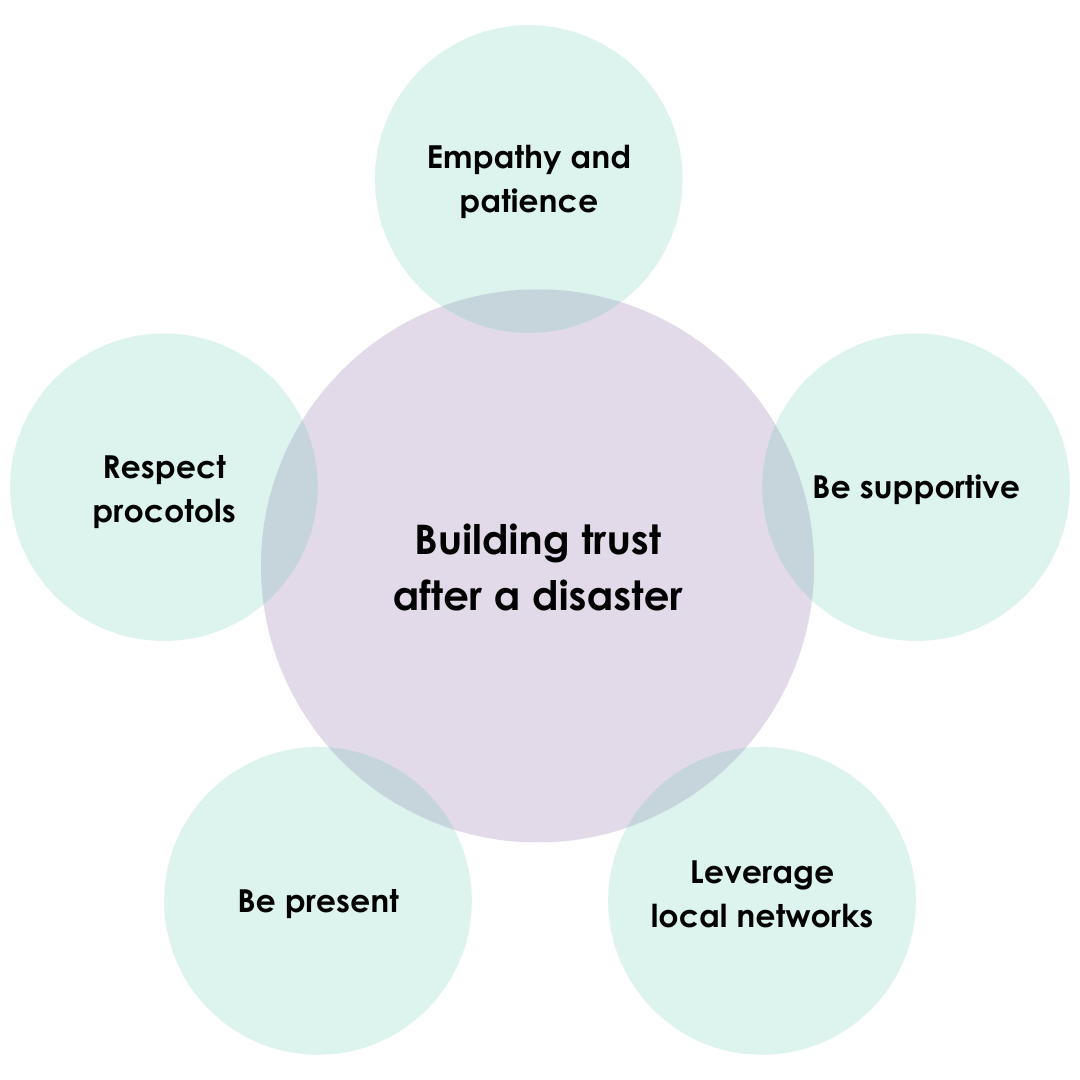
- Empathy and patience are key. Remember, your counterpart might have been through a lot emotionally.
- Be supportive, not a burden. Offer assistance without adding to the counterparts’ workload. Understand that your counterpart may be feeling overwhelmed providing support in the quickest and most efficient way.
- Leverage local networks. Connect with local actors and communities; take advantage of the ‘solidarity spirit’ that usually develops following a disaster.
- Be present and be true to yourself and your organisation by being consistent, and transparent. Implement your commitments and communicate your objectives and plans in a clear way.
- Respect protocols. Use established communication channels, internally (within your organisation, between different departments, etc.) and externally (with other organisations, counterparts, etc.) Do not improvise at this stage.
3. Choose the strategy that suits your capacities, objectives and role
There are two types of strategies that can be adopted following a disaster: the ‘horse’ and the ‘camel’.
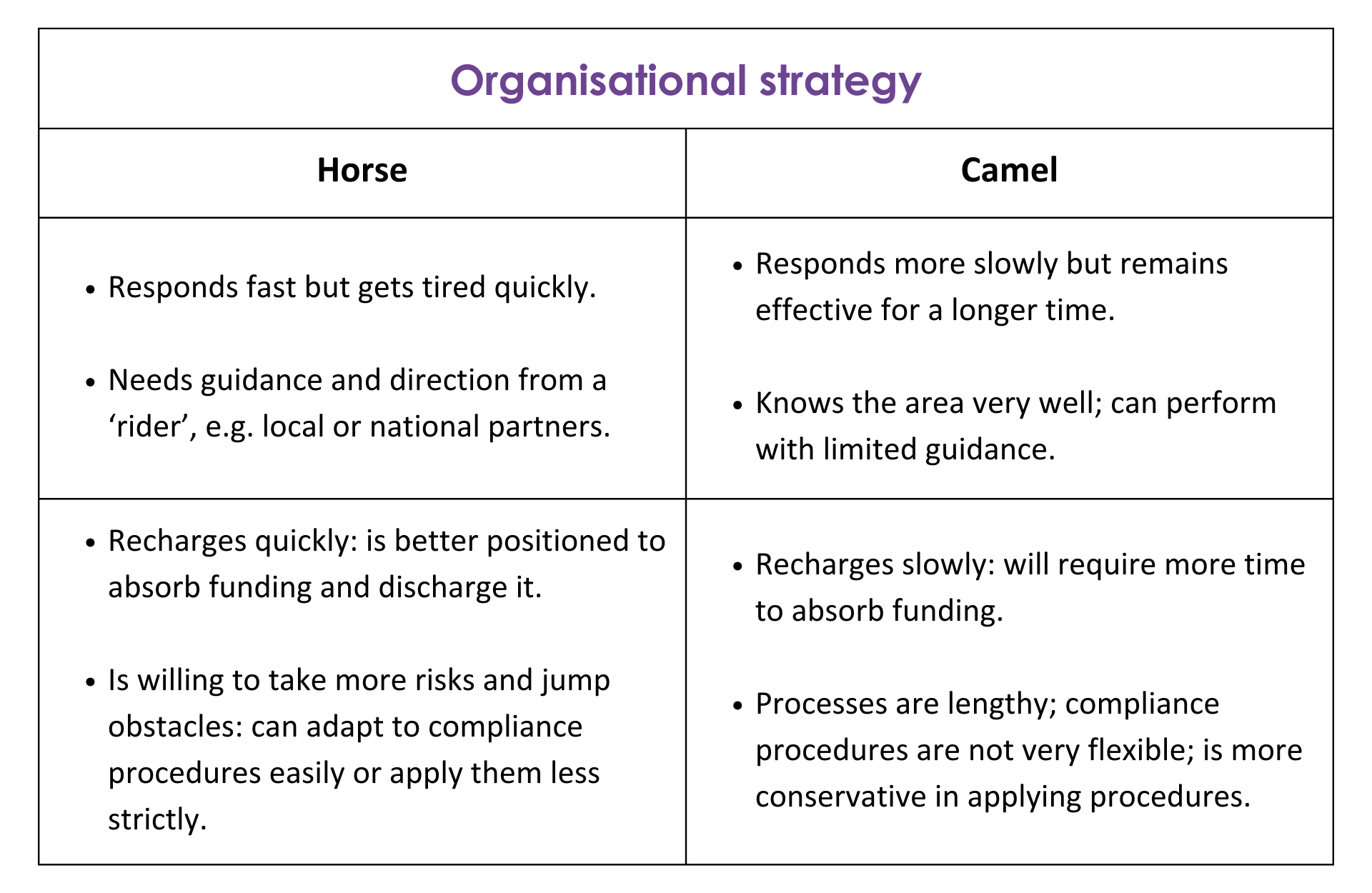
Both strategies are needed after a disaster. These approaches can be helpful particularly when partnerships are at play.
- The ‘horse’ generates trust in the short term, while the ‘camel’ generates trust in the longer term.
- The ‘horse’ brings the organisation closer to local authorities and armed groups, while the ‘camel’ helps create links with national authorities, communities, and donors.
- The ‘horse’ can pave the way to dialogue and relationships for the ‘camel’ to use, improve, and strengthen.
- The ‘horse’ negotiates to implement; the ‘camel’ negotiates to coordinate.
Which one is the most suitable for you and your organisation? Assess carefully. You might be either or both, depending on your organisational objectives, needs, and the context.
4. Cooperate, don’t compete: remember the common goal
To avoid duplicating efforts, collaborate with organisations working on similar projects, objectives and outcomes or serving the same populations.
Cooperating helps pool time and resources and can lead to a more targeted and effective disaster response.
It’s important to resist the temptation to ‘monopolise’ the response and compete. It is easier to work in silos, but more effective to work together.
Don’t lose sight of the common goal and shared values – you are all there to help the same people affected by disasters. Leverage this to navigate negotiation challenges.
5. Be aware of actual and perceived risks when negotiating compliance, funding, or resource mobilisation with donors
Responding quickly might require a solid understanding of compliance procedures, policies, and ways of working.
When operating in the aftermath of disasters, there seems to be a need to compromise on compliance procedures, to deal with bureaucratic challenges and delays when collaborating with partners or donors, and to negotiate alternative ways of funding for immediate response.
Being aware of ‘actual’ and ‘perceived’ risks can help you negotiate the adaptability of existing programs with donors.
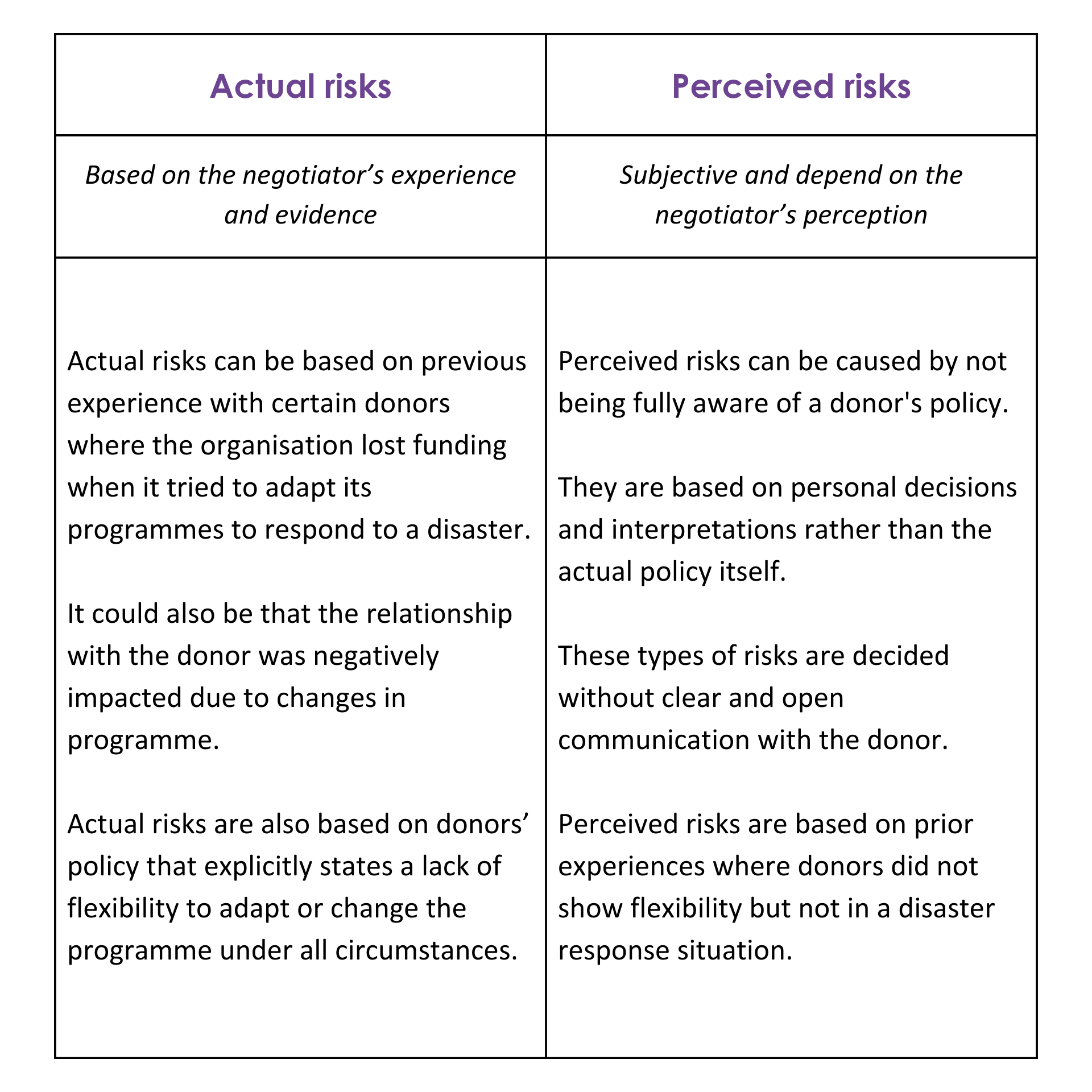
Humanitarians shared their learnings on negotiating with donors during times of disasters.
“Make sure to have an emergency response protocol. In an emergency, I cannot ask for an invoice, for example. There must be exemptions. Be ready to use common sense in [an] emergency or do not get involved.”
“We also focused on diversifying the types of agreements. Especially to deal with small scale ‘donations’ which required different compliance process.”
“Engage with the donors to not restrict the funding [and limit our options] during disasters as more complex issues might evolve and impact the people. We need a more agile way of responding.”
Remember...
Humanitarian negotiations in the context of disasters require adopting a ‘human’ approach, probably more than any other type of negotiations, because anyone can be impacted: your colleagues, your counterparts, the communities, and yourself.
It’s key to be empathetic but prepared; focused but flexible; and supportive but transparent.
As disasters bring moments of chaos, pre-established emergency protocols, especially on compliance and support services, can streamline negotiations and facilitate smoother collaboration among stakeholders.
Before diving into response efforts, take a moment to reflect on the disaster and its implications; this will help you design a more informed and strategic approach.
Remember to leverage existing partnerships, especially with local actors, which facilitate negotiation processes and enhance the humanitarian response. At the same time, disasters can offer opportunities to connect with new stakeholders and build new relationships.
Good luck!

